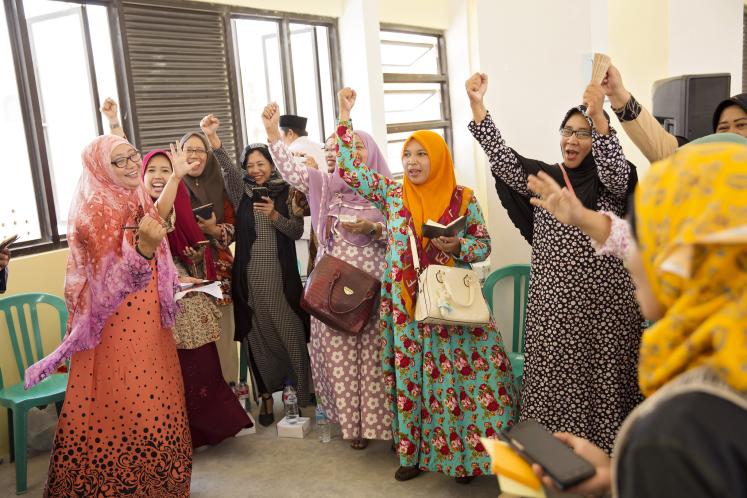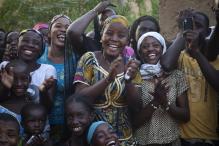2020 was a difficult year for many, including those working to strengthen and uphold women’s rights in conflict situations. The year was challenging not only due to COVID-19 but also because the year marked the twentieth anniversary of UN Security Council Resolution 1325 on Women, Peace, and Security (WPS). This anniversary brought with it a plethora of celebrations of progress. However, these commemorations were tinged with regret over how much work is still to be done to implement 1325 and subsequent resolutions in order to achieve true gender equality in all fora, including politics and peace processes, and to protect women from gender-based violence in conflict contexts.
Some notable difficulties for the WPS agenda became apparent in 2019. Geopolitical forces that frustrate other areas of the Council’s work began to spill over to its efforts to uphold women’s rights. The tension reached new levels in October 2020, when there was cause for fear that a potentially damaging negotiation would weaken the WPS agenda. Luckily, a majority of Council members’ desire to continue to push for women’s rights overrode the complicating geopolitics.
WPS stakeholders, especially NGOs, breathed a collective sigh of relief. This was a demonstration of the majority of Security Council members’ commitment to protecting and enabling the work of women in conflict contexts. It also demonstrated that the Council as a whole is still a functioning multi-lateral body in which the priorities of all of its members – not just a select handful – can lead it to prevent backtracking on its previous work and motivate it to respond to the needs of civilians in conflict. Furthermore, the fact that women-led organizations all over the world were concerned about the proposed text shows the impact that the Council’s work can have at the community level, where these organizations value the ability to point to Security Council resolutions as norms that should guide government action.
Given the world’s current focus on immediate needs relating to COVID-19, it is hard to think of what the next 20 years of WPS could look like. But the work of the Security Council must continue. Given the relevant historical accomplishments of each of the incoming 2021 cohort - including India’s prioritization of the inclusion of women in its peacekeeping contingents, Norway and Ireland’s experiences of ensuring women’s participation in peace processes, Kenya’s recent renewal of its National Action Plan on WPS, and Mexico’s January 2020 launch of a feminist foreign policy – the Security Council is well-positioned to continue to drive implementation of the agenda this year. Specifically, it should reflect on progress made in three specific areas and seek to make further advances in 2021 in the following ways.
-
In the last few years, UN sanctions have been more specifically designed to target perpetrators of sexual violence in war zones. Perpetrators in some countries now face global travel bans and asset freezes, in addition to the stigmatization of appearing on a global sanctions list. Currently, seven of the 14 UN sanction regimes have specific criteria to target perpetrators in the Democratic Republic of the Congo (DRC), Central African Republic, Mali, South Sudan, Yemen, Libya and Somalia. The Council has listed thirteen individuals and four entities under these regimes with reference to their responsibility for acts of sexual violence. As such, sanctions are one of the few tools available to the Council for making good on its promise to tackle this scourge with more than words. However, despite this seemingly positive shift, acts of sexual violence have not yet been a stand-alone reason to sanction any individual or organization. Instead, the Council has only sanctioned perpetrators who were also found to be disrupting peace talks, funding illicit activities, or collaborating with terrorist groups. This pattern of decision-making sends the message that acts of sexual violence alone are not serious enough to warrant sanctions and brings into question the Council’s commitment to address conflict-related sexual violence in a meaningful way. The Council must therefore follow through on its written commitments: prevent impunity for conflict-related sexual violence as a stand-alone offence worthy of Council action using sanctions and other tools at its disposal.
-
The Security Council recently began to pay increased attention to attacks against women, human rights defenders and women peacebuilders, particularly those who are invited to participate as briefers in Council meetings. A 2019 report highlighted the dangers human rights defenders face, and cited that 304 had been killed in 2019. Eighty-five percent of those killed had been threatened either individually or as part of the community or group in which they worked. The Council responded to this report and evidence of increased reprisals against civil society briefers by calling for the creation of safe and enabling environments for civil society in Resolution 2493 of October 2019. They also met informally in February 2020 to discuss reprisals against women human rights defenders and women peacebuilders who participate in Council meetings. However, little further action has been taken to address reprisals against civil society briefers, despite the tools at the Council’s disposal – ranging from public statements or letters to parties carrying out attacks, to sanctions that could be used to punish those responsible. These reprisals are therefore passing relatively unseen – and even more desperately unaddressed. The Council should build on the momentum it created in late 2019 and early 2020 by continuing its work on this issue – consulting closely with briefers to ensure that their specific protection needs are met, and taking action to safeguard the crucial practice of inviting civil society briefers to participate in Council meetings.
-
Finally, COVID-19 has impacted women-led organizations in conflict settings all over the world, decreasing their access to funding and political space and placing obstacles on those who could not easily adapt to virtual modes of work. At the same time, new needs and priorities for their crucial work were revealed as governments and non-State armed groups enacted new rules, women were kept under lockdown, and domestic violence rates soared. These organizations rose to the test, swiftly adapting in whatever ways they could in order to continue – and even expand – their work and address these new challenges.Meanwhile, the Security Council recognized the impact of COVID-19 on civilians in conflict but has been slow to address the gendered impact of the pandemic and the role that women-led organizations can play in addressing its short, medium, and long-term consequences. In 2021, the Council’s voice could carry significant weight in ensuring that these organizations are adequately supported and recognized in their work as the COVID-19 crisis continues. Unified and frequent calls on governments and armed groups to facilitate humanitarian access and guarantee the political and societal space for women-led organizations to carry out their work, would go a long way. This would serve to not only protect and support these entities but also to resolve the challenges brought about by the pandemic. Council members who are able to commit funding to these organizations should do so as swiftly and directly as possible in order to ensure that these words translate to action.
The members of the Security Council, and all of us, are now entering a post-2020 world that promises to look radically different from the previous year. The Council should recommit to addressing the rights of women in conflict, both in ways that are specific to COVID-19 challenges and through work that seeks to address decades-old threats such as sexual violence and reprisals against women whose work contributes to peace. As the world gradually emerges from the shock of 2020, the Council’s effectiveness in responding to security issues will more than ever be measured by its ability to listen to communities, recognize and address real-world problems, and support their solutions. The Women, Peace, and Security agenda is an ideal realm in which the Council can demonstrate that it can be an effective force for good in this new world.
Suggested citation: Cristal Downing, Dr Rebecca Brubaker., "Women’s Rights in a Post-2020 World: What Could (or Should) Be Next for Gender at the Security Council," UNU-CPR (blog), 2021-01-03, https://unu.edu/cpr/blog-post/womens-rights-post-2020-world-what-could-or-should-be-next-gender-security-council.


